
Birthright Citizenship Will be Overturned
President Trump, Congress, and the Supreme Court will finally end this outrageous precedent.
President Trump will sign an executive order to end birthright citizenship for the children of illegal aliens who are born in the USA at the end of January 2025.
Legacy media is furious, and multiple MSM articles make the case that “legal scholars” and “respected attorneys” believe that this would violate the 14th Amendment to the United States Constitution. Headlines, such as the ones below dominate the MSM circuit:
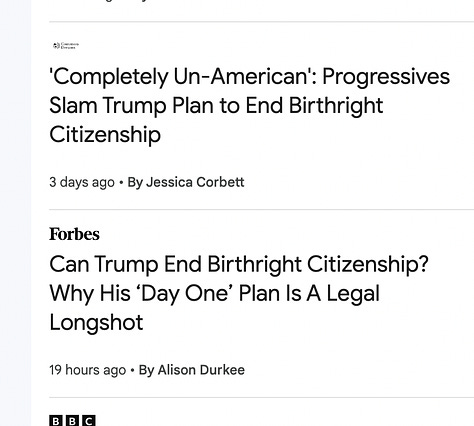
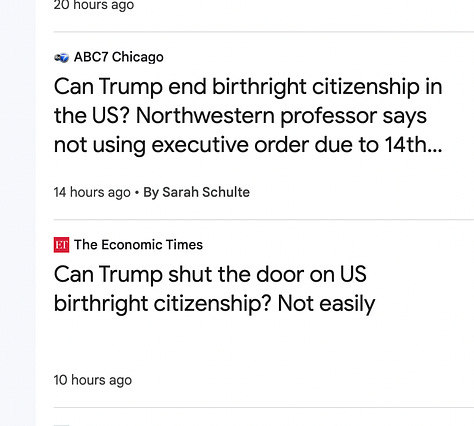
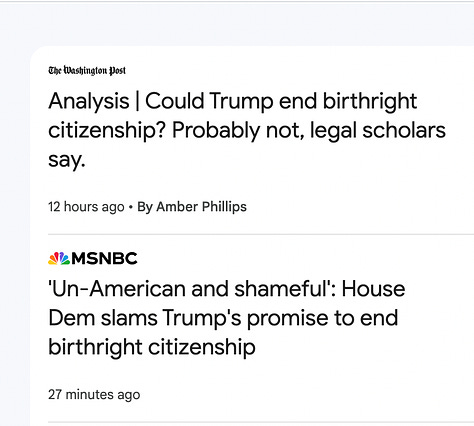
But what does the Fourteenth Amendment really mean, and could President Trump’s executive order withstand court challenge?
“All persons born or naturalized in the United States, and subject to the jurisdiction thereof, are citizens of the United States and of the state wherein they reside. No state shall make or enforce any law which shall abridge the privileges or immunities of citizens of the United States; nor shall any state deprive any person of life, liberty, or property, without due process of law; nor deny to any person within its jurisdiction the equal protection of the laws”
-Section 1 of the 14th Amendment to the United States Constitution
Section 1 of the 14th Amendment, also known as the Citizenship Clause, was ratified by Congress on July 9, 1868, and was meant to extend citizenship to freed slaves and their children.
Whether or not the 14th Amendment applied to people who were not citizens was challenged in Federal district courts and the Supreme Court ruled in 1898 in a case known as “United States v. Wong Kim Ark.” This was the landmark Supreme Court ruling that determined that a child, in this case, Wong Kim Ark, born in the United States to parents who were ineligible for naturalization (due to a long-defunct law that barred Chinese immigrants from becoming naturalized citizens), was still a U.S. citizen entitled to all rights and privileges of citizenship under the 14th Amendment. This established a precedent for birthright citizenship for all children born on US soil. The Supreme Court has not revisited this ruling, so the precedent of the Wong Kim Ark stands to this day. It all seems straightforward enough. Right? Wrong…
The fourteenth amendment clearly states that persons born in the United States must be “subject to the jurisdiction thereof.”
The question is, what does that phrase mean?
Unfortunately, many modern day legal scholars have defined that term based on Section 1 of the Fourteenth Amendment, explicitly referring to “The United States v. Wong Kim Ark.” So, it is hard to get an unbiased definition.
But the truth is that the United States v. Wong Kim Ark case is very different from what has happened today. That is, the masses of illegal aliens using this legal precedent to cross the border for the purpose of having “anchor babies.” An "anchor baby" is a child born in the United States to non-citizen parents, automatically gaining U.S. citizenship due to birthright citizenship laws. These babies then often provide the legal anchor for the guardians of this child to apply to stay in the United States and also collect entitlements for the child. As aside, the weaponization of words has made the term “anchor baby” a pejorative. Yet, it is a very accurate description of what is happening all across America.
My opinion is that President Trump’s executive order will target those children who are born to illegal aliens, as he has said in multiple interviews.
It's important to note that while Wong Kim Ark's parents were legally residing in the United States, they were not eligible for U.S. citizenship due to the Chinese Exclusion Act of 1882.
Section 1 of the 14th amendment was never meant to apply to the children of people in this country illegally.
An excellent article on the 14th amendment was written in 2018, by Hans A. von Spakovsky, legal scholar at the Heritage Foundation. In that article, he explains:
Critics erroneously believe that anyone present in the United States has “subjected” himself “to the jurisdiction” of the United States, which would extend citizenship to the children of tourists, diplomats, and illegal aliens alike.
But that is not what that qualifying phrase means. Its original meaning refers to the political allegiance of an individual and the jurisdiction that a foreign government has over that individual.
The fact that a tourist or illegal alien is subject to our laws and our courts if they violate our laws does not place them within the political “jurisdiction” of the United States as that phrase was defined by the framers of the 14th Amendment.
This amendment’s language was derived from the 1866 Civil Rights Act, which provided that “[a]ll persons born in the United States, and not subject to any foreign power” would be considered citizens.
Sen. Lyman Trumbull, a key figure in the adoption of the 14th Amendment, said that “subject to the jurisdiction” of the U.S. included not owing allegiance to any other country.
As John Eastman, former dean of the Chapman School of Law, has said, many do not seem to understand “the distinction between partial, territorial jurisdiction, which subjects all who are present within the territory of a sovereign to the jurisdiction of that sovereign’s laws, and complete political jurisdiction, which requires allegiance to the sovereign as well.”
In the famous Slaughter-House cases of 1872, the Supreme Court stated that this qualifying phrase was intended to exclude “children of ministers, consuls, and citizens or subjects of foreign States born within the United States.” This was confirmed in 1884 in another case, Elk vs. Wilkins, when citizenship was denied to an American Indian because he “owed immediate allegiance to” his tribe and not the United States.
American Indians and their children did not become citizens until Congress passed the Indian Citizenship Act of 1924. There would have been no need to pass such legislation if the 14th Amendment extended citizenship to every person born in America, no matter what the circumstances of their birth, and no matter who their parents are.
Even in U.S. v. Wong Kim Ark, the 1898 case most often cited by “birthright” supporters due to its overbroad language, the court only held that a child born of lawful, permanent residents was a U.S. citizen. That is a far cry from saying that a child born of individuals who are here illegally must be considered a U.S. citizen.
Of course, the judges in that case were strongly influenced by the fact that there were discriminatory laws in place at that time that restricted Chinese immigration, a situation that does not exist today.
How this could all play out in the coming months and years:
Sen. Mike Lee (R-UT) and other Republican legal scholars argue that “and subject to the jurisdiction thereof,” should exclude the children from illegal aliens from the protections.
This could be accomplished simply by applying Section 5 of the 14th Amendment. Section 5 states that: "The Congress shall have power to enforce, by appropriate legislation, the provisions of this article."
Hence, by a simple majority, Congress can clarify the Section 1 clause of the 14th Amendment.
In the meantime, we can expect that President Trump’s executive order will rely on legal scholars to distill what the 1868 Congress meant when they passed the 14th Amendment.
This will then be followed by Congressional action to clarify further and enforce the full provisions of section 1 of the 14th Amendment.
Of course, it will be challenged in the court of law, with the Supreme Court making the final determination.
The final result will most likely be a scaling back of the 14th Amendment to its original intent. It won’t happen as quickly as one might hope, but it will happen. This will alter the fabric of the United States for future generations and is critically important to maintaining the fabric and nature of American society.
Legal immigration will not stop, nor does anyone want it to. But the United States can not allow unfettered and illegal immigration. The vast majority of Americans agree on this point.
These controls start with both the closing of the border and the loophole developed by the Supreme Court ruling of 1898, which is known as “United States v. Wong Kim Ark”. President Trump is right - birthright citizenship will end because the legal precedent used to maintain this status quo is defunct. It is just a matter of time and will. President Trump has the will and four more years - so let’s get it done!

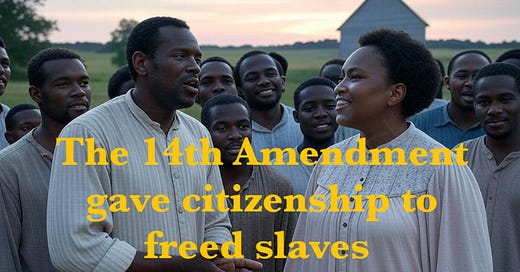



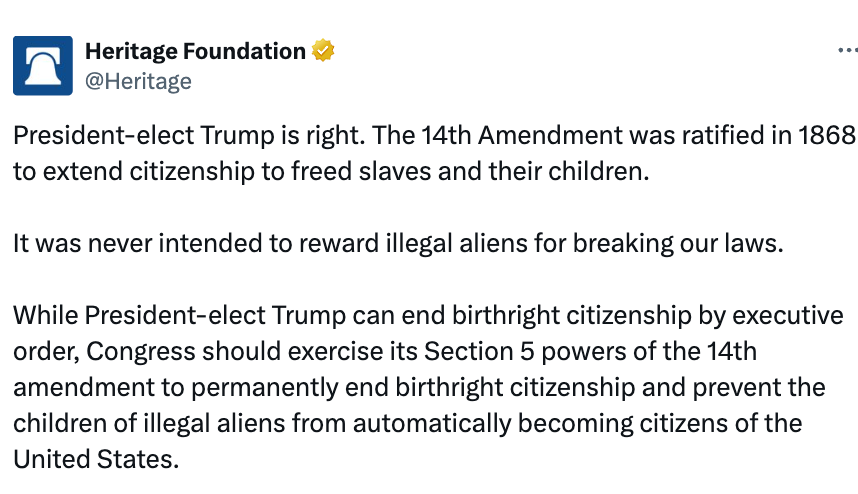











I’m not sure how many people realize that China (and other countries) currently send their pregnant citizens into the U.S., first class, gaining a tourist visa, having the baby in the U.S., and then flying the family back to China. The child does not lose its Chinese citizenship but they do become American citizens and begin receiving benefits as you say. This child can now enter the U.S. forever and whenever they want. This happens, not just with the Chinese obviously, but everyday of the week and every hour of the day, and the tax payer is on the hook for this insanity. No other country in the world does this, so why in hell do we? We have a 40 trillion dollar deficit, It’s insane!
If I may offer my perspective posted yesterday, approaching this subject from a different angle (hopefully) highlighting how farcical the "advocates'" interpretation of "birthright citizenship" actually is, once one considers it this way:
"To accept the current practice(s) of 'birthright citizenship,' one has to accept the premise that the United States of America has decided that any woman anywhere in the world can unilaterally grant her child (or children) U.S. citizenship, merely by showing up on U.S. soil in time for delivery. In fact, she doesn’t even have to be legally present in the United States, she merely has to 'migrate' here in time for the blessed event of birth.
"When we put it that way, doesn’t the absolute stupidity, the inherently farcical nature of the currently-accepted practice come into sharp relief?"
https://tomwigand.substack.com/p/birthright-citizenship-inherently